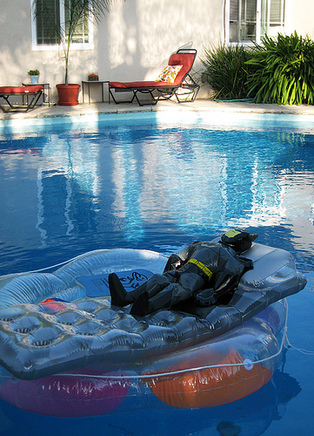|
An EPA-reported $5,250,000,000 is spent on fossil fuel-derived fertilizers for American lawns. That alone is reason to lead the crusade for greener, more eco-friendly backyards. Along with the fact that 30 to 60 percent of urban water is being used on lawns, it's time to start rethinking the traditional concept of your lawn being a lush carpet with perfectly groomed grass. Take a look around your backyard. What changes can you make to become more environmentally responsible? Reduce Lawn SizeGas lawnmowers, power equipment injuries, toxic fertilizers, pollution... no more. Reduce the size of your lawn to a small area, plant a garden in its place. Add native flora because it usually thrives in local conditions which eliminates extra energy. Consider an herb bed or suburban meadow. Alternates to grass include clover, artificial lawns and putting-green grass. Reducing the amount of synthetic fertilizers and pesticides in the lawn offers healthier ways to go outside to play. CompostA win-win, composting reduces trash output by hundreds of pounds a year and naturally fertilizes gardens. Get an adjustable home compost bin (Planet Natural $35) or dedicate an area away from the house as your compost pile. Start putting your green materials like yards clippings and food scraps into the bin to supply the necessary nitrogen, allowing breakdown of composting materials. Mix in brown materials like paper and leaves (high in carbon). Composting will release nutrients to plants as you improve your environmental standings and reduce household waste. Saltwater PoolIf you have an existing pool, you could drain it and cover it or switch out the toxic chlorine with saltwater. A salt chlorine generator converts salt into chlorine, naturally sanitizing your pool. You will pour large bags of plain table salt (non-iodized) right into the pool. Because they eliminate the need for expensive chemicals, saltwater pools are better for the environment and for your personal health, skin and wallet. Click here for inground pool products. Another option is to use a constructed wetland as the pools water filtration system. Pumped water will pass through different types of plants and soil, naturally taking the impurities out as they become nourished. You end up with a balanced aquatic ecosystem. Use a Pool CoverHeat reduction is an ecological benefit to having a pool cover. Also, evaporation can be reduced by 90 percent, saving water usage and energy. Harvest RainwaterPut a rain barrel out during a shower (or under a downspout) and have water free of chlorine and additives to water your garden and clean your patio. Invite Bug EatersLadybugs eat aphids that destroy crops and flowers. Plant bright flowers to give the little ladies a place to live and reproduce. Birds eat plant and herb destroying pests like slugs, snails and caterpillars. Welcome them into your backyard by offering birdseed and bird houses. Cover photo from Flickr user Maegan Tintari / ...love Maegan.
1 Comment
|


 RSS Feed
RSS Feed
